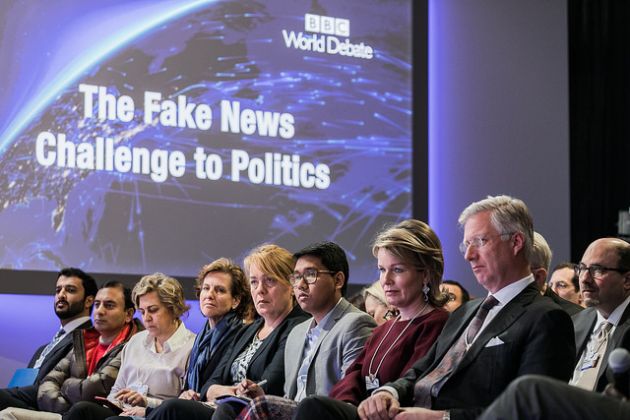'Threat of fake news' is focus of Pope Francis 2018 World Communications Day message

Pope Francis has called for a "journalism for peace" in response to the threat of fake news, which "thrives on the absence of healthy confrontation with other sources of information."
The Pope on Jan. 24 released his message for World Communications Day, which is held annually on the Sunday before Pentecost, falling this year on May 13.
"The truth will set you free" (John 8:32). Fake news and journalism for peace" is the theme of the Pope's message.
His message was released the same day the World Economic Forum announced a new Global Center for Cybersecurity to help build a safe and secure global cyberspace, which is another threat in the sphere of fake news as it relates to the instruments used to spread it.
The center will be based in Geneva, Switzerland, and will function as an autonomous organization under the auspices of the World Economic Forum.
WEF said urgent action needed to create safe operating environment for new technologies like artificial intelligence, robotics, drones, self-driving cars and the internet of things.
In Pope Francis' message, he explores what makes fake news 'fake', how to recognize it, truth as an antidote, and how a "journalism for peace" takes people as its focus, says Vatican News.
"In today's fast-changing world of communications and digital systems, we are witnessing the spread of what has come to be known as 'fake news,'
"This calls for reflection, which is why I have decided to return in this World Communications Day Message to the issue of truth, which was raised time and time again by my predecessors, beginning with Pope Paul VI."
He notes that the term "fake news" has been the object of great discussion and debate and that it usually refers to the spreading of disinformation on line or in the traditional media.
"It has to do with false information based on non-existent or distorted data meant to deceive and manipulate the reader. Spreading fake news can serve to advance specific goals, influence political decisions, and serve economic interests," says the pontiff.
He explains that fake news is effective mainly because it can "mimic real news, to seem plausible."
APPEALS TO STEREOTYPES
Such news is false, believable news because it is "captious" as it grabs people's attention by "appealing to stereotypes and common social prejudices."
It exploits "instantaneous emotions like anxiety, contempt, anger and frustration."
"The ability to spread such fake news often relies on a manipulative use of the social networks and the way they function. Untrue stories can spread so quickly that even authoritative denials fail to contain the damage," says Pope Francis.
In his message he says, "Communication is part of God's plan for us and an essential way to experience fellowship. Made in the image and likeness of our Creator, we are able to express and share all that is true, good, and beautiful."
People can describe their own experiences and the world around them thereby creating historical memory and the understanding of events.
"But when we yield to our own pride and selfishness, we can also distort the way we use our ability to communicate," says the Pope.
World Communications Day is the only worldwide celebration called for by the Second Vatican Council in 1963 in the decree on social communications titled "Inter Mirifica."
The pontiff's message is traditionally published in conjunction with the Jan. 24, feast of St. Francis de Sales, patron of journalists.
It is done to allow bishops' conferences, diocesan offices and communications organizations sufficient time to prepare audiovisual and other materials for national and local celebrations.
The first World Communications Day was observed on May 7, 1967, under the Pope Paul VI, who wanted to draw attention to the communications media and the enormous power they have for cultural transformation.